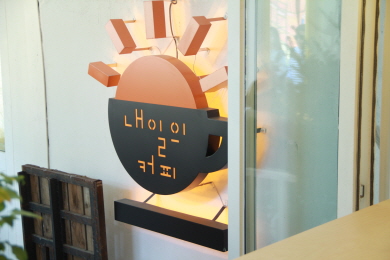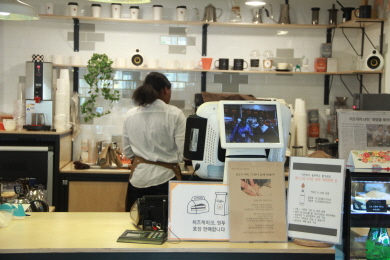
“Nothing will be bitter, neither life nor the coffee itself,” this is the phrase that represents the café. Coffee for Tomorrow is no ordinary café. It is a vocational school that helps refugees in Korea to become independent by successfully adapting to Korean society.
There are a total of 8,819 people who have applied for refugee status in South Korea from 1994 to 2014. However, 438 people, which only compose of five percent of the applicants, were accepted as official refugees. Thus, a majority of the refugees have no job or have a hard time finding a way to support themselves.
Mun Jun-suk came to realize the status of unapproved refugees through a social enterprise called “Refuge pNan.” He volunteered to work at a refuge where he frequently visits. During his visits, Mun made many friends and came to realize their unique charms that have not been recognized due to the common stereotypes Koreans have towards dark-skinned foreigners.

Mostly, refugees have fled from their countries due to wars, religious conflicts, political hassles, and many other conflicts, they maintain a positive attitude. The majority of the refugees that Mun has met comes from different parts of Africa. Moon discovered that the African culture values enjoyment and try to maintain a positive attitude in spite of the hardships one may go through.
Mun has come to respect his friends, and thus he wanted to establish a vocational school where the refugee’s blend of charms can change ethnic or cultural biases shared among many Koreans. This is how he came up with the idea to establish Coffee for Tomorrow.
At his café, Mun uses African coffee beans. Since many Koreans think highly of the quality of African coffee beans, he connected the café with the refugees. He educates African refugees to become baristas.
After seeing the colorful works of African culture, Mun also discovered that his refugee friends have a good taste in designing. So he designed the café with his friends’ works, such as cushion patterns or wall decorations.
As he started to set up the café, Mun quit his former job and studied to become a barista. He applied for a socioeconomic idea contest organized by Wiki Seoul, a contest administered by Seoul Metropolitan Government, and received the grand prize. Mun said that he had received help from many of his friends, but he pointed out that his wife was the biggest supporter of all, both emotionally and practically.
“My wife was very supportive of my plans,” Mun said. “She knew I was deeply interested in social enterprises and since she has volunteered with me at the Refuge pNan, she knows all of my refugee friends and knows how attractive and kind they are. She has also helped me by advertising the café.”
Since the café’s establishment last October, Mun has hired two of his refugee friends as baristas. The two friends work in shifts, and Mun is in the café most of the time to guide them. As they are his friends, Mun jokes around and bursts into laughter as he works at the café.
“My ultimate goal is to enlarge the size of the vocational school to the extent that it includes party planners, designers and other jobs that are created from the refugees’ unique talents,” Mun said. “I do not plan to enlarge the café or make it into a franchise. I just truly want the refugees to utilize their talents and interact with Koreans so that they can get rid of the bias that refugees are violent, dark or moody.”
Lee Jae-lim
jenie1995@ewhain.net

